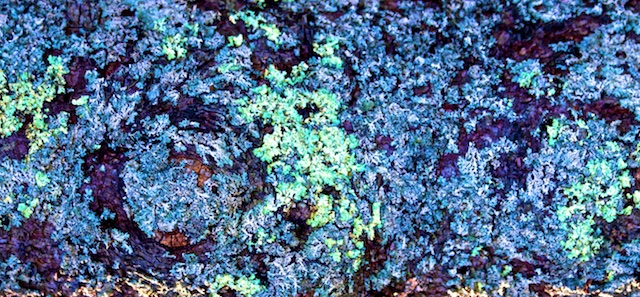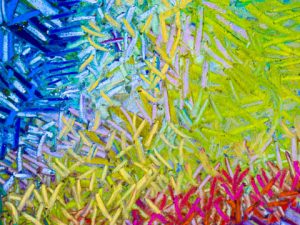
–
“We’ve largely forgotten the incantatory and invocational use of speech as a way of bringing ourselves into deeper rapport with the beings around us, or of calling the living land into resonance with us….The beaver gliding across the pond, the fungus gripping a thick trunk, a boulder shattered by its tumble down a cliff or the rain splashing upon those granite fragments–we talk about such beings, about the weather and the weathered stones, but we do not talk to them. Entranced by the denotative power of words to define, to order, to represent the things around us, we’ve overlooked the songful dimension of language so obvious to our oral ancestors. We’ve lost our ear for the music of language–for the rhythmic, melodic layer of speech by which earthly things overhear us.
How monotonous our speaking becomes when we speak only to ourselves! And how insulting to the other beings–to foraging black bears and twisted old cypresses–that no longer sense us talking to them, but only about them, as though they were not present in our world. As though the clear-cut mountainside and the flooding creek had no sensations of their own–as though they had no flesh by which to feel the vibration of our speaking. Small wonder that rivers and forests no longer compel our focus or our fierce devotion. For we talk about such entities only behind their backs, as though they were not participant in our lives.
Yet if we no longer call out to the moon slipping between the clouds, or whisper to the spider setting the silken strut of her web, well, then the numerous powers of this world will no longer address us–and if they still try, we will not likely hear them. They withdraw from our attentions, and soon refrain from encountering us when we’re out wandering, or from visiting us in our dreams.
We can no longer avail ourselves of their perspectives or their guidance, and our human affairs suffer as a result. We become ever more forgetful in our relations with the rest of the biosphere, an obliviousness that cuts us off from ourselves, and from our deepest sources of sustenance.”
David Abrams
I like this quote, but I want to clarify that to me it is not talking about pantheism. If I take issue with the statement at all it is because ultimately the only communication is between divine Love and its creation. But I think it is worthy to think about because too often we undervalue all the aspects of creation that are not ourselves. All the qualities and attributes need to be brought to bear in consciousness as well as in conversation. Things need to be resolved into thoughts. And I cannot help but remember Jesus talking forthrightly to the storm, “Peace, be still.” What if we directly and consciously interacted with the whole of creation? How can we be loving stewards otherwise? I think it would bless us immeasurably to be less self focused and more inclusive of every wonder in each distinct detail of creation.
–

2 Comments
-
I title that last photo….”Pangea”. (Did I spell that right?)
-
If David Abrams’ view has merit, then the observation that ” ultimately the only communication is between divine Love
and its creation ” is superfluous. Paul affirms that God is self-revealed in and through the things that have been made. Please
note Romans 1 :20. ” Ever since the creation of the world his invisible nature, namely his eternal power and deity, has been
clearly perceived in the things that have been made. “






